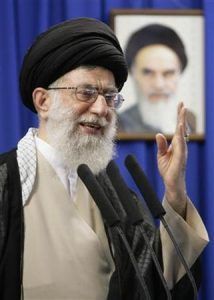By John Irish and Marine Pennetier
PARIS, June 5 (Reuters) – Israel’s leader urged France on Tuesday to turn its attention to tackling Iran’s “regional aggression”, saying he no longer needed to convince Paris to quit world powers’ 2015 nuclear deal with Tehran as economic pressure would kill it anyway.
Benjamin Netanyahu was in Paris for talks with President Emmanuel Macron as part of a tour to persuade the European signatories – Britain, France and Germany – to follow Washington’s lead in pursuing a tough stance on Iran after it pulled out of the accord and reimposed sanctions on Tehran.
“I didn’t ask France to withdraw from the JCPOA (Iran deal) because I think it is basically going to be dissolved by the weight of economic forces,” Netanyahu told a joint news conference with French President Emmanuel Macron.
“If you have a bad deal you don’t have to stick to it especially if you see that Iran is conquering one country after another and you cannot divorce this from Iran’s aggression in the (Middle East) region.”
The three European powers are scrambling to save the deal – under which Iran curbed its nuclear programme in return for a lifting of international sanctions – as they regard it as the best chance to stop Tehran developing an atomic bomb.
[aesop_image img=”https://kayhanlife.com/wp-content/uploads/2018/06/download-2.jpg” panorama=”off” align=”center” lightbox=”on” caption=”French President Emmanuel Macron and Israeli Prime Minister Benjamin Netanyahu attend a joint news conference at the Elysee Palace in Paris, France, June 5, 2018. REUTERS/Philippe Wojazer/Pool” captionposition=”left” revealfx=”off” overlay_revealfx=”off”]
Israel maintains that Iran duped the West into a one-sided deal and plans to use the break from sanctions to build up its financial reserves before returning to full-scale enrichment of uranium for future nuclear weapons.
Macron did not appear receptive to Netanyahu’s argument. “I told the prime minister of my deep conviction, which is shared with our European partners, that the accord needs to be preserved to ensure control of nuclear activity,” he said.
U.S. President Donald Trump denounced the 2015 accord, reached under predecessor Barack Obama, as it did not cover Iran’s ballistic missile programme, its role in Middle East wars or what happens after the deal begins to expire in 2025.
The European powers share those concerns but say that the accord, also negotiated with China and Russia, is the best way to prevent Tehran developing a nuclear weapons capability.
Macron reiterated that he wanted to open up new negotiations on the other issues of concern to Washington.
Iran has long said it wants nuclear energy only for civilian uses. Tehran says its ballistic missiles are for defensive purposes only and non-negotiable, and that it has every right to support its allies involved in regional conflicts.
FINANCIAL HEAT
The European powers are trying to come up with a package to ring-fence trade with Iran against renewed U.S. financial sanctions to dissuade Tehran from quitting the accord.
But the global reach of the U.S. financial system, forcing companies to choose between two irreconcilable options – selling to Iran or to the vast U.S. market – is driving home the limits of European efforts to create financial mechanisms that could shield revived trade with Tehran.
That has left Europe under pressure from Tehran.
“If Iran does not get the financial guarantees in oil and access to the financial system, then I don’t see Iran sticking to the deal because the pressure from (Iranian) hardliners is only increasing,” said a Western official.

“It is quite possible they will resume enrichment capacity and research and development of advanced centrifuges to show the Europeans and the world that they are serious.”
On Monday, Supreme Leader Ayatollah Khamenei said he had ordered preparations to increase uranium enrichment capacity if the nuclear agreement fell apart after the U.S. withdrawal.
Iran on Tuesday informed the U.N. nuclear watchdog of “tentative” plans to produce the feedstock for centrifuges, the machines that enrich uranium.
“I call on all sides to stabilise the situation and not give into escalation which will lead to one thing: conflict,” Macron said, adding that the Iranian statements added to tensions, but were not in violation of the nuclear deal.
(Writing by Ori Lewis and John Irish Editing by Mark Heinrich)

